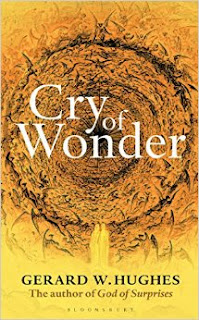It’s Mental Health Awareness Week (11th-17th May), an annual initiative raising awareness of mental health
and wellbeing issues. There is a constant need to bring into the open, not
least among Christians, the invisible severity of mental illness and the pain
of those who live with conditions such as depression and schizophrenia.
This year’s Awareness Week however
focuses on a positive strategy which can lead to improvements in our mental and
often also our physical health - mindfulness. Mindfulness involves creating
space to focus on and lose ourselves in the present moment, to still the deep
places in us, to observe our thoughts, motives and reactions.
I have just finished reading an
inspiring book - Cry of wonder by the
Scottish Jesuit priest Gerard Hughes who died last year aged 91. It’s an old
man’s book, a distillation of a lifetime of wisdom.
Father Hughes’ spirituality centred on the
Spiritual exercises of St Ignatius
which encourage us to seek out God at the core of our being, and to observe
with discernment the impulses we discover there – some prompting love and
goodness, others negativism and darkness.
This Ignatian spirituality is firstly a
thoroughly Christian take on mindfulness and secondly a description of
something I myself have been learning recently.
I have always found it difficult to ‘be
still’. There were rare times when a great peace dropped into my heart and
mind, and in the resulting stillness it was easy to talk to God. There was a
different kind of totally-absorbed focus as I’d sit with a notebook simply
listening to the thoughts and ideas rising up in me.
But more recently, I’ve been learning to
look inward. The first lesson was to accept what I find there – including the
stuff I don’t welcome: negative and destructive thoughts, guilt and other
monsters lurking. It’s easy to turn and run, to label these as ‘the enemy.’ But
I realised that these ‘enemies within’ are part of me, and that I can come to
God as I am, shadow and light, and in
God’s acceptance and love find myself no longer divided but whole. In this
sense of acceptance the dark stuff in me loses its power.
The second lesson was that everything in
my heart has something to teach me. I’m learning to listen to and question my
moods and emotions, my impulses to act or speak, to hope or to despair, seeking
to discern which come from and lead to life, which are sourced in darkness and
lead to a dying of light. One thought shows me how much I need to be liked;
another that I’m striving for personal significant; yet another reveals part of
me as selfish and judgemental. And the very fact of discerning the motive
enables me to acknowledge and smile at these impulses while leaving them
unactioned.
Where do these positive, creative impulses
have their source? Am I simply talking to myself, or as St Ignatius and Gerard
Hughes assure us, encountering God? I used to think seeking God was a reaching
out to the Beyond. Sometimes a Bible verse or a thought from a sermon or a
chapter of a book would come alive in me, but these experiences were comparatively
rare. It seemed to me that the God out there was awakening these insights in me
remotely almost, and I wished God would be more communicative.
Now I realise that when I am still, and
breathe slowly, and step out of my current busyness I find within a well of
wisdom and creativity, the well of God’s Spirit which irrigates deep places in
us, flowing constantly.
These are my experiences on my
clearer-seeing days, which Ignatius would call days of ‘consolation’. (There
are other days, days of ‘desolation’ when it seems we cannot find the pathway
to the well.) This is not a mystical, other-worldly spirituality, but a
spirituality for the everyday, a spirituality of encounter with the God who
delights to meet us. Having met God in the stillness, we can enter, and seek
grace in, and live out of that quiet place even in the thick of our busyness.
One Scottish writer on ‘Christian
mindfulness’ (Richard Johnston) addresses on-line the question of whether
mindfulness promotes self-focus rather than God-focus. He quotes John Calvin’s
conviction that ‘the knowledge of God and that of ourselves are connected.
Without knowledge of self there is no knowledge of God. Without knowledge of
God there is no knowledge of self.’
Finding the well within is neither an
esoteric art to master, nor a special gift for special people. Someone who has
never thought about God before can enter the stillness with the same confidence
as the most dedicated believer and cry ‘I believe! Show me myself, make me
whole.’
(Christian Viewpoint column from the Highland News dated 14th May 2015)



No comments:
Post a Comment